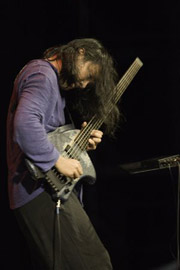
Japanese Jazz: Inspiration, Interpretation, Innovation, and Improvisation
Internet sales for this program are closed. You may pay the fees at the door.
From the big band sounds that swept Japan during the Great War, to the rock-star status afforded to today's greatest jazz ambassadors, Japan's fascination with jazz seems boundless. Japanese musicians often interpret western sounds and musical styles with surprising results, moving and shaping the original sounds in ways that only occur once touched by the Japanese aesthetic. And while scholars puzzle over cultural interpretation and translation, Japanese jazz musicians strive to create new music that both borrows from the greatest elements of the American tradition and moves beyond into unfamiliar creative spaces.
This evening we'll look at how jazz has moved from the background sounds of the war reconstruction to small, New York-like clubs of Tokyo, where modern Japanese musicians make innovative statements full of adventure, artistry, and spirit. We'll listen to and watch exciting and dynamic examples of modern Japanese jazz, focusing on how jazz has been adopted and transformed by musicians like Toshiko Akiyoshi, Hiromi, Stomu Takeishi, and The Ruins.
Cory Combs is a lecturer, bassist, composer and educator living in the San Francisco Bay Area. He has performed with internationally known jazz artists and released several CDs. Combs has presented frequent lectures on music history, including annual appearances at the Asian Art Museum, The Jewish Community Center, Davies Symphony Hall and Herbst Theatre, among other venues. He earned his Bachelorʼs and Masterʼs degrees from the Eastman School of Music and is currently Director of Music, Enrichment and Outreach at the Nueva School, in Hillsborough, CA. He continues to be an active guest clinician and educator at colleges and high schools.
Registration Policies
The Society for Asian Art's cancellation policy requires at least one week's advance written notice in order to receive a refund of registration fees. This excludes our Travel programs, which have separate cancellation policies, as well as any programs where a specific refund policy is stated on the event page. Your fees will be returned to you through a check in the mail. To cancel, please contact us.
For programs located within the Asian Art Museum, the museum entrance fee must be paid separately and is not included with your registration fee.
Please note that by registering for a program, you are giving consent to the SAA to be photographed or videoed as a participant.
